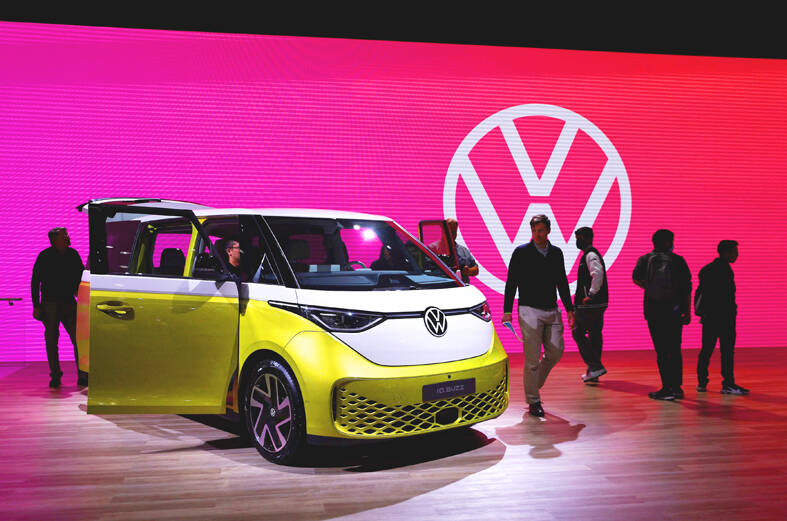Volkswagen AG (VW) might tap Hon Hai Precision Industry Co (鴻海精密) to make electric pickups and sports utility vehicles (SUV) in the US, a person familiar with the matter said, as the German automaker weighs partnerships to support its North American expansion.
VW is in talks with Hon Hai, known internationally as Foxconn Technology Group (富士康科技集團), about cooperating on a factory to make models for its rugged Scout brand, the person said, asking to remain anonymous.
Alternatives include partnering with Magna International Inc’s Magna Steyr and — the least likely option — VW building a factory on its own, the person said.

Photo: Reuters
Volkswagen is “very happy with the progress that Scout is making, and the enthusiasm they are already able to spark,” the company said in a statement, declining to comment further.
Hon Hai did not reply to requests for comment.
Europe’s biggest automaker is reviving the dormant off-road vehicle Scout brand to better compete in the lucrative US pickup and SUV market, but it is running late.
VW plans to unveil prototypes next year and begin production in 2026 — years behind similar models from Ford Motor Co, General Motors Co and Rivian Automotive Inc.
Success in the world’s second-biggest auto market has eluded the manufacturer due to its lack of larger models popular with US drivers.
Hon Hai, the primary assembler of iPhones for Apple Inc, has been looking to expand in the fast-growing electric vehicle (EV) market. The company last year unveiled its first electric concept vehicles and in May completed a transaction to acquire a Lordstown Motors Corp factory in Ohio for US$230 million.
Hon Hai is also involved in Saudi Arabia’s bid to build up a local EV industry.
On Tuesday, Ceer, a joint venture with Saudi Arabia’s Public Investment Fund, said it secured a 1 million square-meter plot within the King Abdullah Economic Center in a deal worth about US$96 million.
Construction on the site, which is near a major Red Sea trading port, is scheduled to start early next year, with initial models of the sedans and SUVs set to be available by 2025.
While sales for VW’s main brand in the US climbed 15 percent to about 375,000 units last year, that is still a far cry from the more than 500,000 vehicles the company delivered during the late 1960s and early 1970s, when its Beetle and minibus proved popular.
VW chief executive officer Oliver Blume identified success in the North American market as one of his 10 priorities after taking over from Herbert Diess in September.
Scout vehicles competed with the Ford Bronco and Land Rover and Jeep models from the 1960s until the business ceased production in 1980. VW bought the name as part of its acquisition of Navistar International Corp in 2020.

The US dollar was trading at NT$29.7 at 10am today on the Taipei Foreign Exchange, as the New Taiwan dollar gained NT$1.364 from the previous close last week. The NT dollar continued to rise today, after surging 3.07 percent on Friday. After opening at NT$30.91, the NT dollar gained more than NT$1 in just 15 minutes, briefly passing the NT$30 mark. Before the US Department of the Treasury's semi-annual currency report came out, expectations that the NT dollar would keep rising were already building. The NT dollar on Friday closed at NT$31.064, up by NT$0.953 — a 3.07 percent single-day gain. Today,

‘SHORT TERM’: The local currency would likely remain strong in the near term, driven by anticipated US trade pressure, capital inflows and expectations of a US Fed rate cut The US dollar is expected to fall below NT$30 in the near term, as traders anticipate increased pressure from Washington for Taiwan to allow the New Taiwan dollar to appreciate, Cathay United Bank (國泰世華銀行) chief economist Lin Chi-chao (林啟超) said. Following a sharp drop in the greenback against the NT dollar on Friday, Lin told the Central News Agency that the local currency is likely to remain strong in the short term, driven in part by market psychology surrounding anticipated US policy pressure. On Friday, the US dollar fell NT$0.953, or 3.07 percent, closing at NT$31.064 — its lowest level since Jan.

The Financial Supervisory Commission (FSC) yesterday met with some of the nation’s largest insurance companies as a skyrocketing New Taiwan dollar piles pressure on their hundreds of billions of dollars in US bond investments. The commission has asked some life insurance firms, among the biggest Asian holders of US debt, to discuss how the rapidly strengthening NT dollar has impacted their operations, people familiar with the matter said. The meeting took place as the NT dollar jumped as much as 5 percent yesterday, its biggest intraday gain in more than three decades. The local currency surged as exporters rushed to

PRESSURE EXPECTED: The appreciation of the NT dollar reflected expectations that Washington would press Taiwan to boost its currency against the US dollar, dealers said Taiwan’s export-oriented semiconductor and auto part manufacturers are expecting their margins to be affected by large foreign exchange losses as the New Taiwan dollar continued to appreciate sharply against the US dollar yesterday. Among major semiconductor manufacturers, ASE Technology Holding Co (日月光), the world’s largest integrated circuit (IC) packaging and testing services provider, said that whenever the NT dollar rises NT$1 against the greenback, its gross margin is cut by about 1.5 percent. The NT dollar traded as strong as NT$29.59 per US dollar before trimming gains to close NT$0.919, or 2.96 percent, higher at NT$30.145 yesterday in Taipei trading